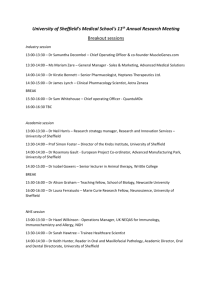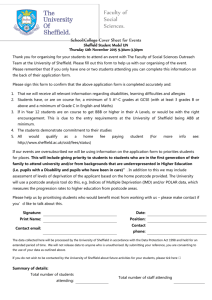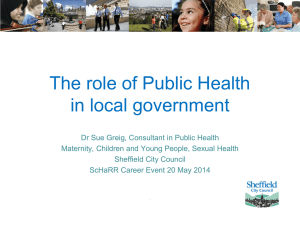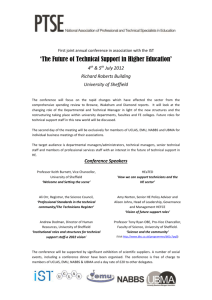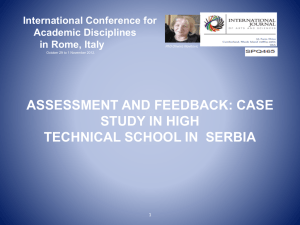2014 lectures
advertisement
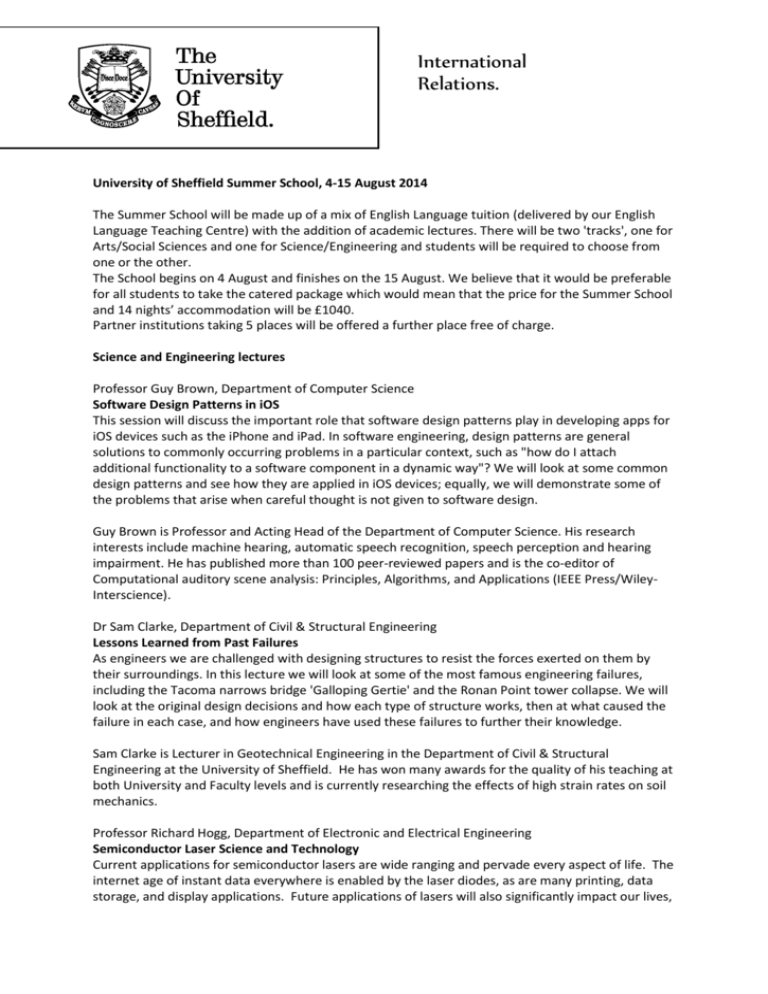
International Relations. University of Sheffield Summer School, 4-15 August 2014 The Summer School will be made up of a mix of English Language tuition (delivered by our English Language Teaching Centre) with the addition of academic lectures. There will be two 'tracks', one for Arts/Social Sciences and one for Science/Engineering and students will be required to choose from one or the other. The School begins on 4 August and finishes on the 15 August. We believe that it would be preferable for all students to take the catered package which would mean that the price for the Summer School and 14 nights’ accommodation will be £1040. Partner institutions taking 5 places will be offered a further place free of charge. Science and Engineering lectures Professor Guy Brown, Department of Computer Science Software Design Patterns in iOS This session will discuss the important role that software design patterns play in developing apps for iOS devices such as the iPhone and iPad. In software engineering, design patterns are general solutions to commonly occurring problems in a particular context, such as "how do I attach additional functionality to a software component in a dynamic way"? We will look at some common design patterns and see how they are applied in iOS devices; equally, we will demonstrate some of the problems that arise when careful thought is not given to software design. Guy Brown is Professor and Acting Head of the Department of Computer Science. His research interests include machine hearing, automatic speech recognition, speech perception and hearing impairment. He has published more than 100 peer-reviewed papers and is the co-editor of Computational auditory scene analysis: Principles, Algorithms, and Applications (IEEE Press/WileyInterscience). Dr Sam Clarke, Department of Civil & Structural Engineering Lessons Learned from Past Failures As engineers we are challenged with designing structures to resist the forces exerted on them by their surroundings. In this lecture we will look at some of the most famous engineering failures, including the Tacoma narrows bridge 'Galloping Gertie' and the Ronan Point tower collapse. We will look at the original design decisions and how each type of structure works, then at what caused the failure in each case, and how engineers have used these failures to further their knowledge. Sam Clarke is Lecturer in Geotechnical Engineering in the Department of Civil & Structural Engineering at the University of Sheffield. He has won many awards for the quality of his teaching at both University and Faculty levels and is currently researching the effects of high strain rates on soil mechanics. Professor Richard Hogg, Department of Electronic and Electrical Engineering Semiconductor Laser Science and Technology Current applications for semiconductor lasers are wide ranging and pervade every aspect of life. The internet age of instant data everywhere is enabled by the laser diodes, as are many printing, data storage, and display applications. Future applications of lasers will also significantly impact our lives, in particular in healthcare monitoring, imaging and therapy. This seminar will describe semiconductor laser manufacturing technologies, and possible future healthcare applications. A tour of the EPSRC National Centre for III-V Technologies will also be included. Richard Hogg is Professor of Semiconductor Devices at the Department of Electronic and Electrical Engineering at the University of Sheffield. He has worked in corporate R&D, semiconductor manufacturing, and has established a group in Sheffield, which develops semiconductor lasers for a range of applications, in particular, new devices for 3D imaging of skin tissue. Professor Mark Geoghegan, Department of Physics and Astronomy Nano for beginners The phrase nanotechnology was coined nearly three decades ago as a proposed successor to the hugely successful microtechnology industry of the time. Is nanotechnology living up to all of the hype that has been surrounding it? Can nanotechnology change the way we live, and to what extent is it doing so already. Is it safe? In this interactive lecture we shall discuss all of these issues, and suggesting where the answers may lie. Mark Geoghegan is Professor of Soft Matter Physics in the Department of Physics and Astronomy and Visiting Professor at the University of Bordeaux. He is an editor of Reports on Progress in Physics and on the Editorial Advisory Board of Polymer. His recent book (with Professor Georges Hadziioannou) is entitled Polymer Electronics (Oxford University Press, 2013). He also co-edited a text book (with RW Kelsall and IW Hamley) called Nanoscale Science and Technology (Wiley, 2005). Professor Alistair Warren, Department of Biomedical Science Human Anatomy There is a natural fascination with our body; what it looks like, how it works and why it goes wrong. Human Anatomy became prominent in Europe around the1500s when the phrase ‘Know thyself’, as the Latin variant “nosce te ipsum“ was reported in the Anatomical Fugitive Sheets. These were a series of anonymous anatomical illustrations of stages of human dissection, printed in Venice. The fascination with the human body has continued and Anatomical Investigation in modern Science, Medicine, Arts and Humanities is as important and intriguing today as it ever was. This presentation will give a brief background to Anatomical Investigation, consider its place in Society and provide some illustrations of the importance of knowing more about our own body. Alistair Warren is Professor and Director of Learning and Teaching in the Faculty of Science at the University of Sheffield, UK. He has been a member of the Council of the Anatomical Society of Great Britain and Ireland, Associate Editor of the Journal of Anatomy and a Home Office Licensed Teacher of Anatomy. Arts and Humanities and Social Sciences Lectures Professor Mike Braddick, Department of History Citizens of the world? Towards a new political history for the global age What difference can we make to the problems that now confront us? We act only as citizens of nation states, and yet it is clear that nation states are often unable to resolve problems acting alone. In this lecture I consider why the nation state came to seem so influential and why it has now come to seem insufficient to address our political challenges. I will also consider the ways in which people in the past were able to act above or below the level of the state in order to address their problems, offering an historical context for recent developments in local and global activism. If we are to be effective citizens in the 21st century we will need to be, more than we are now, citizens of the world. Mike Braddick is Professor of History at the University of Sheffield. He has published extensively on the history of the English state and its early empire, on popular politics and on the English revolution. He has been involved in a number of collaborative, interdisciplinary projects on the theme of state formation and political engagement, ranging across Europe, North America, Latin America, Africa and East Asia, from 1500 to the present. Dr Alasdair Cochrane, Department of Politics Just Killing? Theories of Humanitarian Intervention (and Their Critics) While the notion of humanitarian intervention is not entirely new, it became an increasingly important issue for theorists and policymakers in the early 1990s. Interventions in Somalia and Bosnia, regret over failure to act in Rwanda and elsewhere, and talk of ‘ethical foreign policies’ in Europe, posed a profound challenge to the presumption against intervention in international law. This culminated in 2001 when the International Commission on Intervention and State Sovereignty produced its report for the General Assembly of the UN, ‘the Responsibility to Protect’. But is there a legitimate moral case for violating sovereignty in the name of humanitarian causes? Or is that case too easily exploited and abused by states for ulterior and thoroughly immoral motives? This lecture explores the issues. Alasdair Cochrane is Lecturer in Political Theory at the University of Sheffield. He teaches on a number of courses, including ‘Human Rights’ and ‘Political Thought and the Rights of War and Peace’. His research interests relate to a range of topical ethical issues, and his most recent book is called Animal Rights Without Liberation (New York: Columbia University Press). Professor Angie Hobbs Plato's Ethics of Flourishing What is a flourishing life and what sort of person do you need to be to live it? What should be the relation between reason and our desires for fame and money? Is the flourishing life the same as the virtuous one? In this lecture and discussion Angie Hobbs explores Plato's answers to these central ethical questions.' Angie Hobbs is Professor of the Public Understanding of Philosophy and was created the UK's first Senior Fellow in the Public Understanding of Philosophy in 2009. She is Honorary Patron of The Philosophy Foundation. Professor Paul Knepper, School of Law Murder Mystery: Why Crime Rates Have Fallen Throughout the World During the last half of the twentieth century, crime rates increased in Europe and North America year after year. It was safe to assume that crime was a big problem and getting bigger. Then, beginning in 1995 or so, crime rates began to fall: in the USA and UK, across Europe, in Australia, Canada, Brazil and Japan. Has crime really decreased? What might explain a decline in crime in so many countries at the same time? Is lower crime a consequence of globalisation? In this session, we will examine the methods criminologists use to measure crime, theories of criminal activity, and the leading explanations for the recent decline in crime. Paul Knepper is Professor of Criminology in the School of Law at the University of Sheffield and Visiting Professor of Criminology, Department of Crime Sciences, University of Lausanne. He is the editor-in-chief of the European Journal of Criminology and a senior editor of the Oxford University Press series Research Reviews in Criminology. His recent book is called Writing the History of Crime (Bloomsbury, London). Professor Elena Rodriguez-Falcon, Director of Enterprise Education Enterprise – title to be confirmed. Elena Rodriguez-Falcon is Professor of Enterprise and Engineering Education and also Director of Enterprise Education at the University. She is also the founder of the Ibberson Centre for Enterprise, better known as the E-lab, which has become the first enterprise satellite for the White Rose Centre for Excellence in Teaching and Learning in Enterprise (WRCETLE), now known as University of Sheffield Enterprise (USE). Professor Rodriguez-Falcon has been awarded the status of Principal Fellow at the Higher Education Academy - one of the first ten in the UK. She lectures on enterprise and business planning, using innovative teaching techniques which have been awarded by the Higher Education Academy, the Royal Academy of Engineering, Enterprise Educators UK (EEUK) and the National Centre for Graduate Entrepreneurship (NCGE). Mr Tom Rhodes Head of International Relations t.rhodes@sheffield.ac.uk Tel. 00 44 114 2229612 http://www.sheffield.ac.uk/internationalrelations
